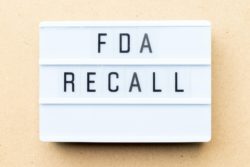Top Class Actions’s website and social media posts use affiliate links. If you make a purchase using such links, we may receive a commission, but it will not result in any additional charges to you. Please review our Affiliate Link Disclosure for more information.
It was no April Fool’s joke when the FDA requested a complete Zantac recall April 1, calling for all prescription and over-the-counter versions of ranitidine to immediately be removed from the market.
Ongoing research indicates Zantac, generically known as ranitidine, contains increasing levels of a contaminant over the course of time and when the heartburn medicine is stored at above-average room temperatures. The contaminant is NDMA, short for N-nitrosodimethylamine, which has been deemed a probable human carcinogen by the World Health Organization (WHO).
Among the cancers that may be related to NDMA ingestion are bladder cancer, stomach cancer and colorectal cancer.
Zantac Recall Over Alarming Levels of NDMA
Back in September 2019, the FDA announced a recall of several generic versions of Zantac due to concerns the medications could have been contaminated with even tiny amounts of NDMA. At that time, ranitidine manufacturer Apotex recalled its over-the-counter strengths of generic Zantac that were sold at Walmart, Walgreens and Rite Aid stores across the country.
Sandoz also issued a recall at that time of its ranitidine capsules after samples were found to be contaminated with NDMA.
At that time, brand name Zantac, which is made by Sanofi, did not discontinue its shipments to the U.S.
As of April 1, the FDA has advised patients to dispose of any brand name or generic Zantac pills or liquid medications immediately and not to buy more.
Walgreens, Walmart and CVS Pharmacy all stopped selling any brand name or generic versions of Zantac in September because of the potential of NDMA contamination.
Zantac Recall and NDMA Fears
The difference in levels of the contaminant in various samples may result from a number of factors. The FDA says factors affecting the levels of NDMA in ranitidine may depend upon the time the products are on the shelf and how hot the room is where the tablets are stored.

The FDA says low levels of NDMA are often present in foods and water, but at such low levels as to not increase our risk of cancer.
When the FDA conducted lab tests last September, NDMA also was found at low levels in Zantac samples, and warned the public of potential risks and to consider using alternative over the counter and prescription medications to control heartburn and related issues.
The new FDA test results reveal that Zantac exposed to certain environmental conditions can cause the drug to have elevated levels of NDMA, which could mean the patient could ingest more that the acceptable daily limit of the contaminant with no way of knowing.
“New FDA testing and evaluation prompted by information from third-party laboratories confirmed that NDMA levels increase in ranitidine even under normal storage conditions, and NDMA has been found to increase significantly in samples stored at higher temperatures, including temperatures the product may be exposed to during distribution and handling by consumers,” said an FDA press release. “The testing also showed that the older a ranitidine product is, or the longer the length of time since it was manufactured, the greater the level of NDMA.”
Safe Disposal of Medications Covered in Recall
Usually, the FDA would recommend disposing of the medication by taking it to a take-back program location, but with the current prevalence of COVID-19, the FDA recommends properly disposing of the medications at home.
Zantac is not to be flushed down the toilet. Instead, the FDA recommends taking the following steps to safely and responsibly dispose of ranitidine medications:
- Do not crush tablets or capsules, but place the tablets, capsules or liquid in a mixture of something unpalatable, such as dirt, cat litter or coffee grounds.
- Place the mixture in a container, such as a sealed plastic bag.
- Throw the sealed bag out in the household trash.
- If you had prescription ranitidine, make sure to cross out all of your personal information on the prescription label of the empty bottle to make sure it cannot be read and then dispose of the container in the trash.
Anyone who has been on a regimen of Zantac or generic ranitidine and has been diagnosed with stomach, bladder or colorectal cancer may qualify to participate in this Zantac lawsuit investigation.
Join a Free Zantac Cancer Lawsuit Investigation
If you or a loved one was diagnosed with stomach cancer or bladder cancer after taking Zantac or another ranitidine medication, you may qualify to join this Zantac cancer lawsuit investigation. Learn more by filling out the form on this page for a free case evaluation by a Zantac cancer injury lawyer.
ATTORNEY ADVERTISING
Top Class Actions is a Proud Member of the American Bar Association
LEGAL INFORMATION IS NOT LEGAL ADVICE
Top Class Actions Legal Statement
©2008 – 2024 Top Class Actions® LLC
Various Trademarks held by their respective owners
This website is not intended for viewing or usage by European Union citizens.
Get Help – It’s Free
Join a Free Zantac Cancer Lawsuit Investigation
If you qualify, an attorney will contact you to discuss the details of your potential case at no charge to you.
PLEASE NOTE: If you want to participate in this investigation, it is imperative that you reply to the law firm if they call or email you. Failing to do so may result in you not getting signed up as a client or getting you dropped as a client.
E-mail any problems with this form to:
Questions@TopClassActions.com.













